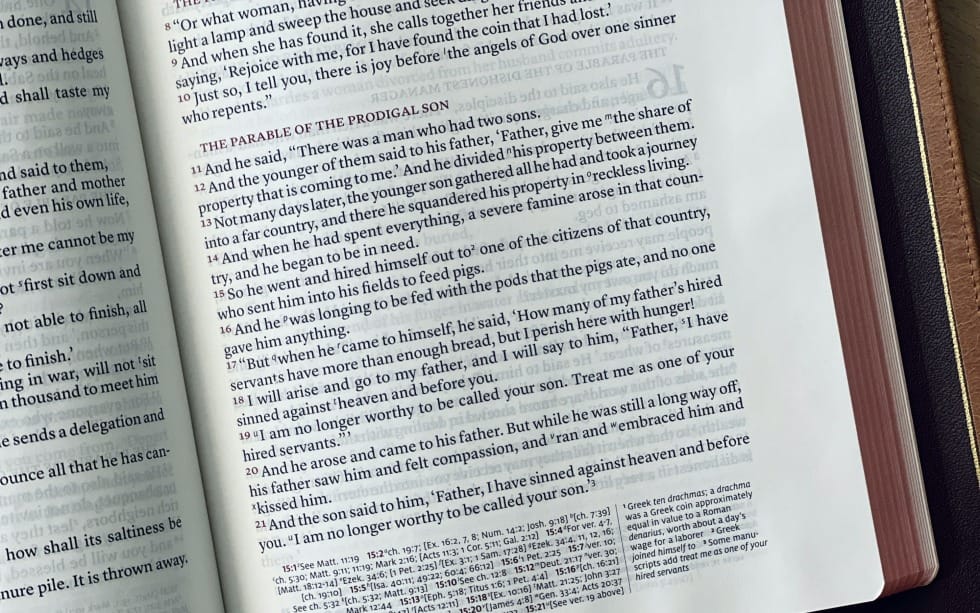What is the “Real Story” of the Prodigal Son? (Luke 12-15)
What comes to mind when you hear the story of the Prodigal Son? Many believers know it well and can recall most of the details.

Luke 12-15
Today's Scripture Passage
A Few Thoughts to Consider
What comes to mind when you read the story of the Prodigal Son?
If you’re like many Christians, you have a pretty good grasp of this story and might be able to fill in most of the details. Luke 15 gives us this narrative, and it comes after Jesus has given a series of calls to repentance, miraculous healings, and parables. Jesus is speaking to two groups of people—tax collectors and sinners and the Pharisees and scribes.
As Timothy Keller notes, the first group “observed neither the moral laws of the Bible nor the rules for ceremonial purity followed by religious Jews. They engaged in ‘wild living.’ Like the younger brother, they ‘left home’ by leaving the traditional morality of their families and of respectable society. The second group of listeners was the ‘Pharisees and the teachers of the law,’ who were represented by the elder brother.”[1]
This parable tells the story of a younger son who demands his inheritance from his father. Not only was this request a sign of tremendous disrespect, but it was also extremely humiliating for the father. In a time when generational wealth was tied to land, this would have meant that the father would have split his land in two. N.T. Wright says, “The shame that this would bring on the family would be added to the shame the son had already brought on the father by asking for his share before the father’s death; it was the equivalent of saying ‘I wish you were dead.’”[2]
After squandering his wealth, the prodigal son returns home. We see the father running to greet his son, an act seen as undignified and certainly not what his son deserved. For many readers today, this is the climax of the narrative. But it’s actually only the first part. The second part is the role of the elder brother, who wants nothing to do with celebrating his younger brother’s return.
In The Prodigal God, Timothy Keller notes that “Jesus uses the younger and elder brothers to portray the two basic ways people try to find happiness and fulfillment: the way of moral conformity and the way of self-discovery.”[3] The younger son’s actions would have been easy for the religious leaders to condemn because they were so blatantly wrong. However, the reactions of the elder son are more subtle, and the fact that Jesus lumped both brothers into the same story would have infuriated the religious leaders. Keller writes,
Through this parable Jesus challenges what nearly everyone has ever thought about God, sin, and salvation. His story reveals the destructive self-centeredness of the younger brother, but it also condemns the elder brother’s moralistic life in the strongest terms. Jesus is saying that both the irreligious and the religious are spiritually lost, both life-paths are dead ends, and that every thought the human race has had about how to connect to God has been wrong.[4]
A Meditation to PRAY
Praise | Lord, I praise you for your grace that welcomes both the lost and the self-righteous with open arms. You reveal your heart through the parable of the Prodigal Son, showing us that your love reaches beyond our failures and pride. Thank you for the mercy that embraces us, no matter where we have wandered.
Release | I release my tendencies to judge others, especially when I think I am doing everything right. Free me from the mindset of the elder brother, who believed that his good works entitled him to your blessings. Help me let go of any bitterness or resentment that has taken root in my heart so I can see others through your eyes.
Ask | I ask for a heart that mirrors your compassion and love, especially towards those who have strayed or those who challenge my own righteousness. Teach me to seek you not for what you can give but for who you are. May I desire your presence above all else and reflect your grace to others.
Yield | I yield to your transforming power, allowing you to reshape my heart and mind. I surrender my efforts to earn your favor and accept that your love is a gift, not a reward. Help me to live in a way that invites others to experience your grace and to rejoice in every soul that returns to you.





